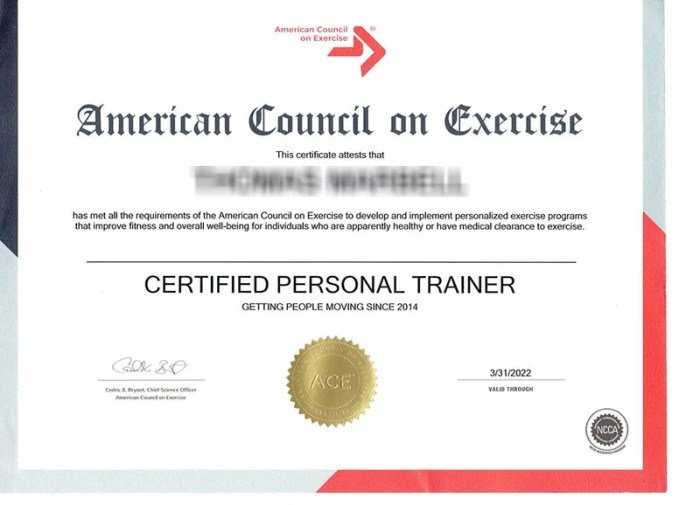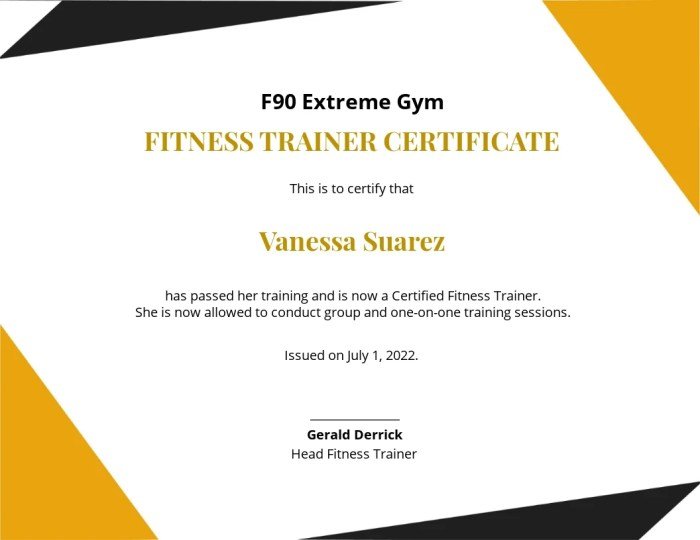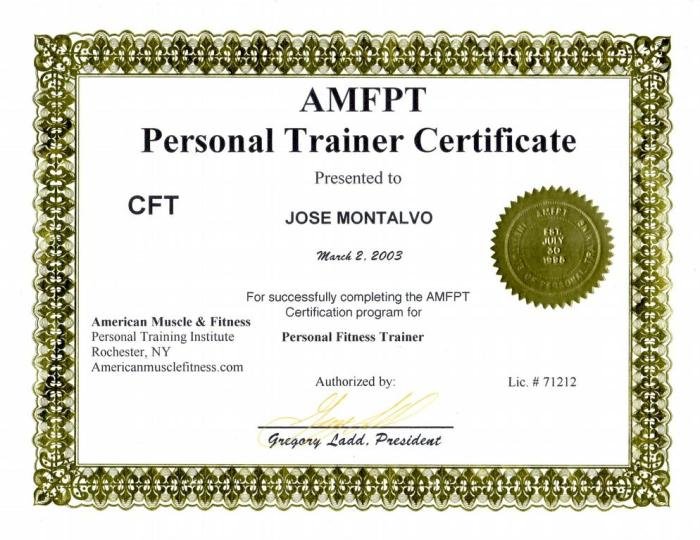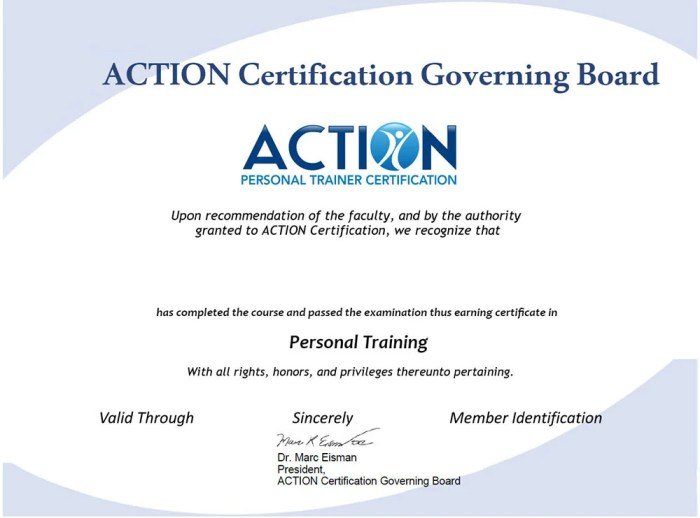Best fitness trainer certification is the key to unlocking a rewarding career in the fitness industry. It provides you with the knowledge, skills, and credibility to guide clients towards their fitness goals, while ensuring their safety and promoting ethical practices.
Earning a certification demonstrates your commitment to professionalism and expertise, setting you apart from the competition. It opens doors to exciting career opportunities, whether you aspire to work in a gym, personal training studio, or even create your own fitness business.
The Importance of Fitness Trainer Certification

In the ever-evolving fitness landscape, obtaining a fitness trainer certification has become increasingly crucial. It serves as a testament to a professional’s commitment to excellence, ensuring both personal growth and the well-being of their clients.
Benefits for Fitness Professionals
Certification offers a myriad of benefits for fitness professionals, enhancing their credibility, knowledge, and career prospects.
- Enhanced Credibility:A certification from a reputable organization serves as a mark of professionalism and expertise, establishing trust with potential clients. It demonstrates a commitment to ongoing education and adherence to industry standards.
- Expanded Knowledge:Certification programs provide a comprehensive understanding of anatomy, physiology, exercise science, nutrition, and training methodologies. This knowledge equips fitness professionals with the tools to design effective and safe workout programs.
- Career Advancement:Certification often opens doors to new opportunities, making professionals more competitive in the job market. Many fitness facilities and organizations require or prefer certified trainers, leading to increased job security and earning potential.
Ensuring Client Safety and Ethical Practices
Certification plays a vital role in promoting client safety and ethical practices within the fitness industry.
- Safe Training Practices:Certification programs emphasize the importance of proper form, risk assessment, and injury prevention. This ensures that fitness professionals are equipped to guide clients through safe and effective workouts.
- Ethical Guidelines:Certification bodies establish codes of ethics that fitness professionals are expected to adhere to. These guidelines cover issues such as confidentiality, professional boundaries, and responsible advertising, promoting a culture of integrity and accountability.
- Legal Protection:Certification can provide legal protection in case of accidents or injuries, as it demonstrates adherence to industry standards and best practices. This can be particularly important in situations where a client claims negligence or lack of professional expertise.
Types of Fitness Trainer Certifications

There are many different types of fitness trainer certifications available, each with its own specific requirements and focus. Choosing the right certification for you depends on your career goals and the type of fitness training you want to do.
Types of Fitness Trainer Certifications
Fitness trainer certifications are generally categorized based on their specialization. Here are some of the most common types:
Personal Training Certifications
Personal training certifications focus on the knowledge and skills needed to design and implement safe and effective exercise programs for individual clients. They cover topics such as exercise physiology, nutrition, program design, and client assessment.
Group Fitness Certifications
Group fitness certifications focus on the skills needed to lead group exercise classes, such as spin, Zumba, or yoga. They cover topics such as class structure, music selection, and motivational techniques.
Specialized Certifications
There are also specialized fitness trainer certifications for specific populations or areas of expertise. These include:
- Senior Fitness Specialist:This certification focuses on the unique needs of older adults and how to design safe and effective exercise programs for them.
- Prenatal and Postpartum Fitness:This certification focuses on the special considerations for pregnant and postpartum women.
- Youth Fitness Specialist:This certification focuses on the safe and effective training of children and adolescents.
- Sports Performance Specialist:This certification focuses on the training of athletes to improve their performance.
- Nutrition Coaching:This certification focuses on the principles of nutrition and how to counsel clients on healthy eating habits.
- Strength and Conditioning:This certification focuses on the principles of strength training and conditioning and how to design programs to improve strength, power, and endurance.
Prominent Certification Bodies
Several reputable organizations offer fitness trainer certifications. Some of the most prominent include:
- American Council on Exercise (ACE):ACE is one of the largest and most respected fitness certification organizations in the United States. They offer certifications in personal training, group fitness, and several specialized areas. ACE is known for its rigorous standards and comprehensive curriculum.
- National Academy of Sports Medicine (NASM):NASM is another highly respected certification organization that offers a variety of certifications, including personal training, group fitness, and specialized areas like sports performance and nutrition. NASM is known for its focus on evidence-based practices and its emphasis on practical skills.
A good fitness trainer certification can be a valuable asset, allowing you to build a successful career helping others achieve their fitness goals. One area you might want to specialize in is drop fitness , which focuses on weight loss and body transformation.
This niche area of fitness training can be highly rewarding, and a strong certification can help you stand out in a competitive market.
- National Strength and Conditioning Association (NSCA):The NSCA is a leading organization for strength and conditioning professionals. They offer certifications in Certified Strength and Conditioning Specialist (CSCS) and Certified Personal Trainer (CPT). The NSCA is known for its rigorous standards and its focus on the scientific principles of strength training and conditioning.
- American College of Sports Medicine (ACSM):ACSM is a leading organization for sports medicine professionals. They offer certifications in Exercise Physiologist (EP-C) and Certified Exercise Physiologist (CEP). ACSM is known for its strong emphasis on scientific research and its focus on the prevention and treatment of chronic diseases.
Comparison of Certification Bodies
Here is a table that compares the key features of different certification bodies:
| Organization | Cost | Exam Format | Target Audience |
|---|---|---|---|
| American Council on Exercise (ACE) | $299-$399 | Multiple-choice exam | Personal trainers, group fitness instructors, and other fitness professionals |
| National Academy of Sports Medicine (NASM) | $349-$449 | Multiple-choice exam | Personal trainers, group fitness instructors, and other fitness professionals |
| National Strength and Conditioning Association (NSCA) | $399-$499 | Multiple-choice exam | Strength and conditioning coaches, personal trainers, and other fitness professionals |
| American College of Sports Medicine (ACSM) | $325-$425 | Multiple-choice exam | Exercise physiologists, personal trainers, and other fitness professionals |
Factors to Consider When Choosing a Certification

Selecting the right fitness trainer certification can be a significant step in your career. It’s crucial to consider various factors that align with your individual goals and aspirations.
Factors to Consider
It’s essential to conduct thorough research and evaluate various certification programs based on specific criteria. Here’s a checklist of factors to consider:
- Career Goals: What are your long-term career aspirations? Do you want to work in a gym, train clients remotely, or specialize in a specific area like nutrition or sports performance?
- Target Clientele: Who do you envision yourself training? Consider your target audience, such as seniors, athletes, or individuals with specific health conditions.
- Budget: Certification programs vary in cost. Determine your budget and look for programs that fit within your financial constraints.
- Reputation and Accreditation: Research the reputation of the certifying organization and ensure it is accredited by a reputable body like the National Commission for Certifying Agencies (NCCA).
- Curriculum: Evaluate the program’s curriculum to ensure it covers essential topics like anatomy, physiology, exercise science, and safety protocols. Look for programs that emphasize practical skills, scientific principles, and ethical considerations.
- Exam Format: Understand the exam format and requirements. Some programs offer multiple-choice exams, while others require practical assessments.
- Continuing Education Requirements: Check the continuing education requirements for maintaining your certification.
- Support and Resources: Look for programs that offer support and resources, such as study materials, online communities, or mentorship opportunities.
Reputation and Accreditation
Choosing a certification from a reputable and accredited organization is crucial. A well-respected organization demonstrates a commitment to quality and ensures that its certification meets industry standards. Accreditation by organizations like the NCCA validates the certification’s rigor and credibility. Look for certifications that are recognized by major fitness industry organizations and employers.
Curriculum
The curriculum of a fitness trainer certification program should provide a comprehensive foundation in exercise science, anatomy, physiology, and safe training practices. Look for programs that:
- Emphasize Practical Skills: Programs that offer hands-on training and practical assessments will equip you with the skills to confidently train clients.
- Focus on Scientific Principles: A strong emphasis on scientific principles ensures you have a solid understanding of how the body responds to exercise.
- Address Ethical Considerations: Ethical considerations are essential for building trust and maintaining professional integrity. Programs that cover topics like client confidentiality, professional boundaries, and ethical decision-making will prepare you to practice responsibly.
The Certification Process

Earning a fitness trainer certification involves a structured process that ensures you possess the necessary knowledge and skills to guide clients safely and effectively. The process typically includes application requirements, study materials, and examinations.
Application Requirements
The initial step is to meet the eligibility criteria set by the certifying organization. This typically involves having a high school diploma or equivalent and a certain level of fitness experience, often documented through personal training hours or a related degree.
Choosing the best fitness trainer certification can be a daunting task, but it’s an investment in your future. You want to ensure you’re learning from experts who understand the latest trends in health and wellness. Some programs even incorporate elements of beauty, such as skincare and nutrition, to help you achieve a holistic approach to fitness.
Consider the beauty master certification, which focuses on integrating beauty practices with wellness for a comprehensive approach. No matter your chosen path, remember that dedication and continuous learning are key to becoming a successful fitness trainer.
Study Materials
Once your application is accepted, you will gain access to study materials. These materials can include textbooks, online modules, practice exams, and videos that cover a wide range of topics, such as anatomy, physiology, exercise science, nutrition, and client assessment.
Examination Procedures
The certification process culminates in an examination that assesses your understanding of the material. The format of the exam can vary, with some organizations offering written exams, practical assessments, or a combination of both. The exam is designed to evaluate your ability to apply your knowledge to real-world scenarios.
Continuing Education
Maintaining your fitness trainer certification requires ongoing education. This involves completing continuing education units (CEUs) at regular intervals, typically every two to three years. CEUs ensure that you stay up-to-date with the latest fitness trends, research, and best practices.
Preparing for the Exam
Preparing for the certification exam is crucial for success. It is recommended to create a study plan that allocates sufficient time for each subject area. Utilize the study materials provided, practice with mock exams, and seek guidance from experienced trainers or mentors.
Benefits of a Fitness Trainer Certification: Best Fitness Trainer Certification

A fitness trainer certification is a valuable investment that can significantly enhance your career prospects and open doors to new opportunities. Not only does it demonstrate your commitment to the field, but it also provides you with the knowledge and skills necessary to work effectively as a fitness professional.
Enhanced Credibility and Marketability
Certification is a powerful tool that can instantly boost your credibility and marketability as a fitness trainer. Clients are increasingly seeking professionals who have a recognized certification, as it signifies a commitment to professionalism and adherence to industry standards.
In a competitive market, certification can help you stand out from the crowd and attract more clients.
Increased Earning Potential, Best fitness trainer certification
Certified fitness trainers often command higher salaries and have greater earning potential than those without certification. This is because employers and clients value the expertise and knowledge that certification represents. Additionally, certified trainers may be eligible for higher-paying positions, such as personal training manager or fitness director.
Real-World Examples
“After getting my certification, I was able to land a job at a high-end gym and start building my own clientele. My clients are confident in my abilities because they know I have the credentials to back it up.”
John, Certified Personal Trainer
Earning a best fitness trainer certification can open doors to diverse career paths, including the burgeoning field of health care work from home jobs. Many online platforms connect certified trainers with clients seeking remote fitness guidance, making it a flexible and rewarding option for those seeking a fulfilling career in the fitness industry.
“I used to work as a freelance trainer, but after getting certified, I was able to secure a full-time position with a salary and benefits. It’s been a game-changer for my career.”
Sarah, Certified Fitness Instructor
Resources and Information for Certification

Obtaining a fitness trainer certification can be a rewarding step in your career. It opens doors to various opportunities, including personal training, group fitness instruction, and coaching. To help you navigate this journey, we’ve compiled a list of valuable resources and information.
Reputable Organizations Offering Fitness Trainer Certifications
- American Council on Exercise (ACE): https://www.acefitness.org/
- National Academy of Sports Medicine (NASM): https://www.nasm.org/
- National Strength and Conditioning Association (NSCA): https://www.nsca.com/
- American College of Sports Medicine (ACSM): https://www.acsm.org/
- International Sports Sciences Association (ISSA): https://www.issaonline.com/
Resources for Further Information
- Fitness Mentors: https://www.fitnessmentors.com/ – This website offers articles, blog posts, and forums dedicated to fitness training and certification.
- The National Federation of Professional Trainers (NFPT): https://www.nfpt.com/ – The NFPT provides resources for fitness professionals, including articles, podcasts, and webinars on various fitness topics.
- Fitness Professionals Blog: https://www.fitnessprofessionalsblog.com/ – This blog offers insights into the fitness industry, including articles on certification, career development, and business strategies.
Comparison of Certification Programs
| Certification Program | Cost | Benefits |
|---|---|---|
| ACE Certified Personal Trainer | $399 | Recognized by many fitness facilities, comprehensive curriculum, strong focus on exercise science. |
| NASM Certified Personal Trainer | $599 | Evidence-based approach, includes practical skills training, strong focus on client assessments. |
| NSCA Certified Personal Trainer | $450 | Emphasis on strength and conditioning, recognized by many fitness facilities, strong focus on exercise physiology. |
| ACSM Certified Exercise Physiologist | $495 | Focus on exercise science and physiology, suitable for those interested in clinical settings, recognized by many healthcare professionals. |
| ISSA Certified Personal Trainer | $299 | Affordable option, online learning platform, focuses on practical application of fitness knowledge. |
Epilogue

Investing in a fitness trainer certification is an investment in your future. It empowers you to make a positive impact on the lives of others, while building a fulfilling and rewarding career in the dynamic field of fitness.
FAQ Resource
What are the most reputable fitness trainer certification organizations?
Some highly respected organizations include the American Council on Exercise (ACE), the National Academy of Sports Medicine (NASM), and the National Strength and Conditioning Association (NSCA).
How long does it take to become a certified fitness trainer?
The time it takes to become certified varies depending on the program and your study pace. It typically involves a combination of coursework, practical training, and exam preparation, which can take several months.
What are the continuing education requirements for maintaining my certification?
Most certification organizations require fitness trainers to complete a certain number of continuing education units (CEUs) every year or two to keep their certification current.